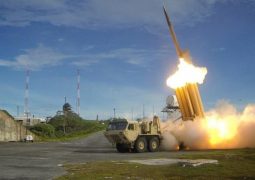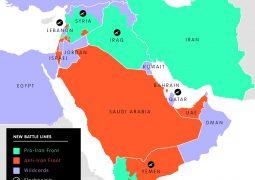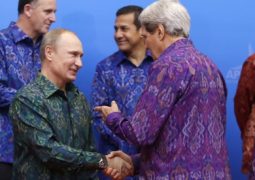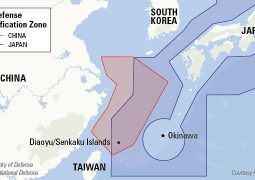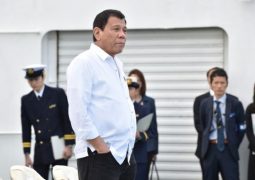Qatar’s repeated mentorship of Gulf Arab neighbors rattles Trump’s anti-Iran axis
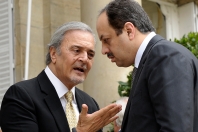
Just 10 days after President Donald Trump called on Muslim countries to stand united against Iran, a public feud between Qatar and some of its Gulf Arab neighbors is jolting his attempt to tip the regional balance of power against Tehran.
Saudi Arabia and the United Arab Emirates (UAE) are incensed by Qatar’s conciliatory line on Iran, their regional arch rival, and its support for Islamist groups, in particular the Muslim Brotherhood, which they regard as a dangerous political enemy.
The bickering among the Sunni states erupted after Trump attended a summit of Muslim leaders in Saudi Arabia where he denounced Shi’ite Iran’s “destabilizing interventions” in Arab lands, where Tehran is locked in a tussle with Riyadh for influence.
The spat shows no sign of abating, raising the prospect of a long breach between Doha and its closest allies that could have repercussions around the Middle East.
Qatari Emir Sheikh Tamim bin Hamad al-Thani visits Kuwait on Wednesday for talks with his counterpart Sheikh Sabah al-Ahmad al-Sabah that are expected to address the rift. Kuwait, a past mediator between Gulf states, has offered to help ease tensions.
But few expect an early end to what is not their first feud. Three years ago Saudi Arabia and the UAE withdrew their ambassadors from Doha for similar reasons, although they returned after less than a year.
Analysts point to the unusual willingness of Qatari state-backed media on one side, and Saudi and Emirati media on the other, to trade rhetorical broadsides in public.
This suggests that point-scoring is taking priority over displays of unity among some members of the Gulf Cooperation Council (GCC), a Saudi-dominated club of states that presents itself as an outpost of stability in a turbulent region.
In the Gulf’s tightly-controlled media scene, attacks made by news outlets tend to be authorized by governments.
“The GCC could harm it own interests in this fight and is at risk of becoming more vulnerable to Iranian encroachment,” said a Western diplomat based in Doha.
EMBOLDENED BY TRUMP
The spat’s immediate cause was a purported Qatari state media report that the emir had cautioned against confrontation with Iran, as well as defending the Palestinian group Hamas and Hezbollah, a Lebanese Shi’ite movement allied to Tehran.
Qatar denied the report, saying its news agency had been hacked, but Saudi Arabia and the UAE allowed their state-backed media to continue running it, angering Doha.
The squabble revives old accusations that Qatar backs the Brotherhood, which is present across most of the Muslim world and whose political ideology challenges the principle of dynastic rule. Riyadh and Abu Dhabi also suspect Doha is complacent about Iranian expansionism.
Some analysts speculate Riyadh and Abu Dhabi felt confident to authorize criticisms of Qatar by their deepening friendship with Trump, confident that his opposition to Iran and all Islamist armed groups reflects their views more than Qatar’s.
“When Trump gave fulsome support in Riyadh and said, ‘let’s isolate Iran’ that sent a signal to the UAE and Saudi, which felt emboldened and said: let’s let loose everything we have on Qatar,” said Gerd Nonneman, professor of International Relations and Gulf Studies at Georgetown University in Qatar.
Acknowledging the tensions, the UAE minister of state for foreign affairs, Anwar Gargash, wrote on Twitter on Sunday that the GCC countries “are passing through a new sharp crisis that carries within it a great danger”.
Gulf officials and commentators outside Qatar said it did not matter whether the remarks were fake because they reflected Qatar’s sympathies anyway.”Doha’s insistence in denying the issue is marginal because in reality, on the ground, Qatar confirms it adopts the policies that it is now trying to deny,” an editorial in Saudi-owned newspaper Al-Hayat on Monday said.
RIFTS HAVE RAMIFICATIONS
A Gulf Arab official said patience had run out. “What is certain is the Gulf states led by Riyadh are not likely to tolerate such a deviation, if intentional, especially at this junction in our relationship with our hostile neighbor Iran.”
Al Raya, a government-owned Qatari daily, hit back at Emirati reports on Friday by publishing pictures on its front page of UAE journalists it called “mercenaries”.
Such animosities can have ramifications across the Middle East, where Gulf states have used their financial and political clout to influence events in Libya, Egypt, Syria, Iraq and Yemen amid upheaval caused by the Arab Spring.
Nonneman said Kuwait and Oman clearly did not want a major rift. “It’s not in the interests of anyone for this to grow into a clash beyond a media campaign – but sometimes these things take on a life of their own,” he said.
Iran, which denies Arab accusations that it is engaged in subversion of Arab countries, appears to be gloating. Kayhan, a newspaper closely associated with Supreme Leader Ayatollah Ali Khamenei, said on Tuesday the rift reflected Saudi Arabia’s inability to “form an alliance against Tehran”.
(Additional reporting by Katie Paul in Riyadh, Sami Aboudi and Noah Browning in Dubai, Borzorgmehr Sharafedin in London, Editing by William Maclean and David Stamp)
Qatar Makes Peace With Its Gulf Neighbors
http://www.washingtoninstitute.org/policy-analysis/view/qatar-makes-peace-with-its-gulf-neighbors
Also available in العربية
November 17, 2014
A late-night agreement in Riyadh appears to have resolved the diplomatic spat between Qatar and its GCC partners, opening up the possibility of more diplomatic coordination and greater unity.
Yesterday, Emir Tamim bin Hamad al-Thani of Qatar was shown kissing the cheek of King Abdullah of Saudi Arabia during a meeting of Gulf leaders in Riyadh, a goodwill gesture underscored by the announcement that the Saudi, UAE, and Bahraini governments will return their ambassadors to Doha. Both moves signal the likely end of a dispute that has festered for more than a year and erupted into the open in March when the envoys were withdrawn. The Saudi Press Agency also announced that Gulf Cooperation Council governments had reached what it called the “Riyadh Complementary Arrangement,” suggesting that they acknowledge the need to at least patch over differences preventing a united front against the “Islamic State”/ISIS and other challenges.
Although Qatari officials have been saying for weeks that the disagreement is over, differences between the fellow GCC members have been apparent even in recent days. For example, Bahrain and the UAE had announced they would boycott a world handball championship being hosted by Qatar in January, while a meeting of foreign ministers planned for next month’s GCC summit in Doha was cancelled. And the day before the Riyadh meeting, the UAE — which has been the most vociferous in complaining that Qatar is supporting the Muslim Brotherhood opposition in other GCC countries — released a long list of MB-affiliated groups that it declared to be terrorist organizations.
Yesterday’s reconciliation was a consequence of mediation by Emir Sabah al-Ahmed al-Sabah of Kuwait. King Hamad bin Isa al-Khalifa of Bahrain was also in attendance, while the UAE was represented by Crown Prince Muhammad bin Zayed al-Nahyan of Abu Dhabi and Sheikh Muhammad bin Rashid al-Maktoum, the ruler of Dubai. The only GCC member absent was Oman, whose ruler, Sultan Qaboos bin Said, is undergoing medical treatment in Germany and is also believed to oppose any further financial and economic union between council states — a possibility implied in the Saudi Press Agency report, which mentioned moving “toward a bold and cohesive Gulf entity.”
The details of the agreement were not revealed. Qatar expelled some leading Brotherhood officials in September and has denied funding extremist groups, but it often seems to enjoy its reputation as a maverick, epitomized by its hosting of the Aljazeera satellite television channel, which has often infuriated Arab governments. Despite hopes to the contrary, thirty-four-year-old Sheikh Tamim appears to be little different from his father, who abdicated last year. Both men aligned with Muhammad Morsi’s Brotherhood administration in Egypt and opposed the military takeover led by current president Abdul Fattah al-Sisi, who is backed by Riyadh and Abu Dhabi. And despite ousting some MB members, Sheikh Tamim has given no indication that he will fully abandon his policy of supporting Islamist groups.
Nevertheless, when faced with the prospect of GCC leaders declining to attend the December 9-10 Doha summit, Sheikh Tamim appears to have blinked first. Assuming the summit will now take place, it remains to be seen whether the ninety-one-year-old King Abdullah, who regards the GCC as a very important institution and has been exasperated by Qatar’s policies, will make an appearance.
The summit has a full agenda apart from its perennial denunciations of Israeli policies and Iran’s long-running occupation of three UAE islands in the Persian Gulf. In Syria, the air forces of Saudi Arabia, the UAE, Bahrain, and Qatar have already joined the U.S. military campaign against ISIS, and removing Bashar al-Assad from power remains a key objective for each government. To varying degrees, GCC members are also worried by Iran’s propensity to exert influence in their territories, as well as the progress of the ongoing nuclear talks.
For the immediate future, then, greater confluence of policy seems likely between GCC states, which seem to recognize the need to display a more united front. This will create opportunities for the United States to push faster against the Assad regime and harder against ISIS. Notions of increased financial and economic union in the GCC will likely remain a mirage, though, at least for the current generation of leaders.
Simon Henderson is the Baker Fellow and director of the Gulf and Energy Policy Program at The Washington Institute.
- Previous Huge bomb in sewage tanker kills at least 80, wounds hundreds in Afghan capital
- Next India’s economic growth slowed to 6.1% in the fourth quarter ending March 2017, compared with 7.1% in the previous quarter, as the government’s note ban decision slowed activity in cash-dependent sectors.



